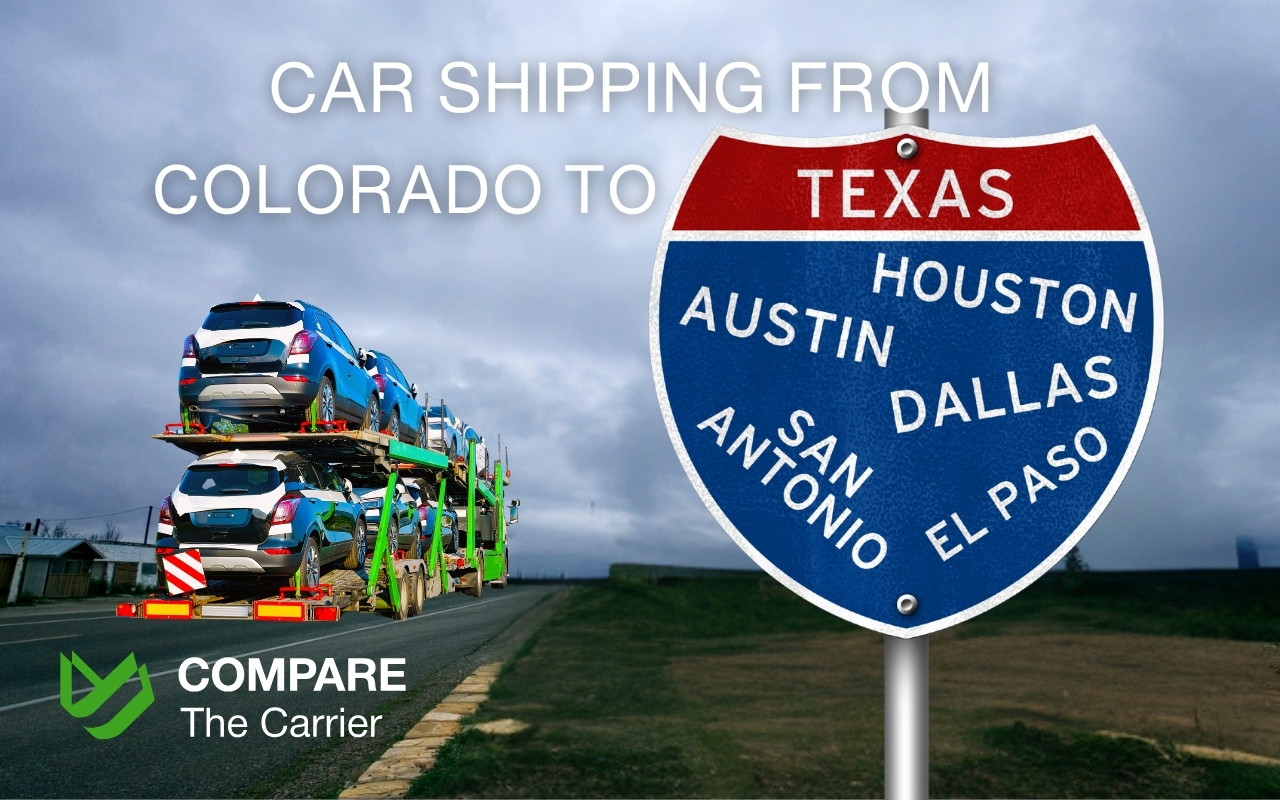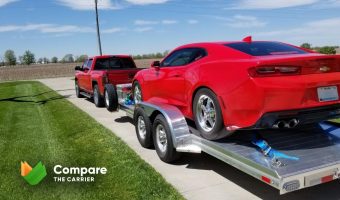Why Ship a Car from Colorado to Texas?
Each year, thousands of vehicles travel from the Rocky Mountains to the Lone Star State — and Colorado to Texas remains one of the most active regional shipping routes in the U.S. According to the Federal Motor Carrier Safety Administration (FMCSA), over 14 million vehicles are transported across state lines annually, with Texas ranking among the top three destination states for auto transport.
From families relocating to booming cities like Austin and Dallas, to military personnel, students, and retirees seeking a warmer climate, the reasons to ship a car from Colorado to Texas are as diverse as the routes themselves. And with fuel prices averaging over $3.80 per gallon in many southern and central states (source: AAA, 2026), driving long distances may not be the most economical — or convenient — option.
Add in unpredictable weather through the Great Plains, over 700+ miles of road time, and potential wear and tear on your vehicle, and it’s easy to see why more drivers are opting for professional auto transport instead of DIY road trips. Whether you’re shipping from Denver to Houston or Colorado Springs to San Antonio, modern tools like CompareTheCarrier.com help you compare prices, review trusted carriers, and book fast, safe delivery from CO to TX — without the guesswork.
When done right, car shipping from Colorado to Texas is simple, secure, and budget-friendly. But the key is understanding how it works, what it costs, and which providers to trust. Let’s break it down.
How Auto Transport Works from Colorado to Texas
Shipping a vehicle from Colorado to Texas is easier than most people expect, especially when working with a trusted auto transporter. Whether you’re moving from Denver to Dallas, Boulder to Austin, or Colorado Springs to Houston, the process is streamlined and built around convenience, safety, and transparency.

Step 1: Request Quotes from Licensed Carriers
Start by using a vehicle shipping calculator or quote form on a platform like CompareTheCarrier.com. You’ll enter basic details:
- Pickup and delivery ZIP codes (from CO to TX)
- Vehicle type, year, and condition
- Preferred transport method (open or enclosed)
- Seasonal demand
- Desired pickup timeframe
You’ll receive multiple offers from top-rated auto shipping companies, helping you compare rates, delivery windows, and insurance options all in one place.
Step 2: Choose a Carrier or Broker
Once you review your options, select a reliable transporter or broker that matches your budget and timeline. Most bookings can be completed online in just a few minutes, with full transparency into cancellation policies and included services.
Check the difference between a broker and a carrier in this guide.
Step 3: Vehicle Pickup in Colorado
The carrier will confirm the pickup date and time, typically within 1–5 business days. On the day of pickup, the driver inspects the vehicle and documents its condition on the Bill of Lading, which you’ll sign.
Step 4: Transit from Colorado to Texas
Your vehicle is loaded onto a transport truck — either open or enclosed — and begins the Colorado to Texas vehicle transport journey. Depending on the route and service type, transit typically takes 2 to 5 days. Some carriers offer GPS tracking or check-in updates during the trip.
Step 5: Delivery and Final Inspection in Texas
Once your car arrives, the driver will conduct a second inspection. You’ll compare the vehicle’s condition to the original Bill of Lading before signing for the delivery. If everything looks good, the job is complete.
Broker vs Carrier: What’s Better for Colorado to Texas Transport?
One of the first decisions you’ll face when arranging car shipping from Colorado to Texas is whether to book directly with a carrier or work with a broker. Both options can get your vehicle from CO to TX, but they operate differently—and the best choice depends on your needs, schedule, and level of experience.
What Is a Carrier?
A carrier is the company that physically transports your vehicle. These are the drivers and truck owners responsible for pickup, transit, and delivery. When you book directly with a carrier, you eliminate the middleman — but it may come with trade-offs.
Pros:
- No broker fees
- Direct communication with the driver
- May offer discounts for repeat customers
Cons:
- Limited availability or route coverage
- Limited pickup day options
- Harder to compare prices
- You must vet licenses, insurance, and reliability yourself
What Is a Broker?
A broker acts as a connector between you and a network of FMCSA-licensed auto transport carriers. Brokers don’t move the vehicles themselves—they coordinate logistics, negotiate pricing, and help match you with the best provider for your shipment.
Pros:
- Access to more carriers, especially for less common routes
- Easier to compare rates, timelines, and reviews
- Brokers handle paperwork, insurance verification, and scheduling
- Ideal for first-time shippers or tight deadlines
Cons:
- Some charge a service fee
- Not all brokers are transparent — choose a reputable one at CompareTheCarrier
So, What’s Better for Shipping from Colorado to Texas?
If you’re comfortable handling logistics and have a specific carrier in mind, booking direct can work. But for most people — especially those seeking speed, pricing flexibility, and peace of mind — a broker or quote comparison platform offers more value.
Compare The Carrier combines the best of both worlds — offering side-by-side quotes from both direct carriers and brokers, with built-in vetting and no hidden markups.
Cost to Ship a Car from Colorado to Texas
One of the most common questions people ask is: How much does it cost to ship a car from Colorado to Texas? While final pricing depends on several variables, the average range for auto transport Colorado to Texas is $600 to $1,000 for standard open transport.
If you’re transporting a larger vehicle, using enclosed shipping, or requesting expedited delivery, expect to pay more — typically $1,100 to $1,500+.
| Route | Vehicle Type | Open Transport | Enclosed Transport |
| Denver, CO to Houston | Sedan | $700 | $1,200 |
| Boulder to San Antonio | SUV | $850 | $1,350 |
| Colorado Springs to Austin | Pickup Truck | $950 | $1,500 |
Pricing reflects current market rates from FMCSA-licensed carriers on CompareTheCarrier.com.
Please note that rates are vary a lot depending on the season you ship your vehicle to Texas. Request a car shipping quote to get the most accurate data.
What’s Typically Included in the Cost?
Most Colorado to Texas vehicle transport quotes include:
- Full cargo insurance
- Door-to-door delivery
- Fuel, tolls, and mileage fees
- Driver labor and inspection documentation
Some carriers offer GPS real-time tracking, expedited delivery service, extended insurance, or flexible pickup windows as optional upgrades.
Key Factors That Influence the Cost of Shipping from Colorado to Texas
While the average Colorado to Texas car shipping cost ranges from $600 to $1,000, the final price you pay depends on several variables. Knowing what impacts pricing helps you plan ahead, avoid overpaying, and choose the right auto transport option for your needs.
1. Distance and Route Specifics
Shipping a car from Denver to Dallas may cost less than Boulder to El Paso due to route efficiency. More direct routes with high carrier traffic tend to be more affordable than rural or less-traveled destinations.
2. Transport Type: Open vs Enclosed
- Open transport is the most common and affordable option.
- Enclosed transport provides extra protection from weather and road debris, ideal for luxury or classic cars — but typically costs 30–60% more.
3. Vehicle Size and Weight
Larger vehicles like trucks and SUVs take up more space and add weight to the carrier’s load, increasing fuel usage and costs. Modified or inoperable vehicles may also incur additional handling fees.
4. Pickup and Delivery Conditions
Door-to-door delivery is standard, but hard-to-access areas (steep driveways, gated communities, remote towns) may require a nearby meeting point, potentially affecting pricing.
5. Time of Year
Demand peaks during seasonal migrations, especially in summer (relocations, students) and winter (snowbirds heading south). Rates are typically higher during these periods.
6. Urgency and Scheduling
Need your car picked up in 24–48 hours? Expedited shipping is available — but it costs significantly more. Flexible pickup windows usually lead to lower prices.
7. Carrier Insurance and Service Level
Premium carriers with five-star reviews, enhanced insurance coverage, or white-glove handling services may charge more — but provide extra peace of mind.
Step-by-Step Guide to Getting Your Car Ready for Cross-Country Shipping
Proper vehicle preparation is key to a smooth and secure car shipping experience from Colorado to Texas. Whether you’re using open or enclosed transport, following this checklist will help avoid delays, disputes, or extra fees during your auto transport Colorado to Texas journey.

Step 1: Clean Your Car (Inside and Out)
A clean car makes it easier to inspect for existing damage during pickup. Dirt and dust can hide scratches, so a fresh wash is essential before the carrier arrives.
Step 2: Take Photos of Your Vehicle
Use your phone to take high-resolution, time-stamped photos of your car from all angles — exterior, interior, wheels, and undercarriage. These images serve as proof of the vehicle’s condition prior to shipping.
Step 3: Remove All Personal Items
Most carriers are not insured to transport personal belongings. Empty the trunk, glove box, and seats to avoid weight penalties and protect your valuables.
PRO TIP: Damage caused by your personal belongings isn’t covered by insurance. If you’re going to ship some things inside the car, make sure they won’t damage the vehicle interior.
Step 4: Reduce Fuel to ¼ Tank
Keep about a quarter tank of gas in the vehicle. This is enough for loading/unloading but light enough to reduce total transport weight.
Step 5: Check for Leaks and Mechanical Issues
Make sure there are no active fluid leaks and that the brakes, tires, and battery are in working order. If your car is not operable, inform the carrier in advance — it will require special equipment and extra fees.
Step 6: Disable the Alarm System
Turn off your alarm system or provide the driver with clear instructions for disarming it to prevent issues during transport.
Step 7: Remove Accessories and Toll Tags
Remove detachable items like bike racks, roof boxes, spoilers, and EZ-Pass or toll tags to prevent damage or unnecessary charges.
Quick Checklist Before Pickup:
- Washed the vehicle
- Documented pre-existing damage
- Emptied the interior
- Fuel tank at ¼
- Mechanical condition checked
- Alarm disabled
- External add-ons removed
Proper prep ensures your Texas car delivery from Colorado is smooth, efficient, and protected from claims or delays.
Choosing Between Open or Enclosed Car Transport from Colorado to Texas Shipment
When arranging car shipping from Colorado to Texas, one of the most important choices you’ll make is between open and enclosed auto transport. Each method offers specific benefits, and the right choice depends on your vehicle type, budget, and personal comfort with risk exposure.
Open Car Transport
This is the most common and cost-effective option for auto transport from Colorado to Texas. Your car is transported on an open-air carrier—similar to what car dealerships use to move new vehicles.
Pros:
- Most affordable option
- Faster availability and scheduling
- Ideal for standard vehicles and daily drivers
Cons:
- Exposed to weather and road debris
- Slightly higher risk of cosmetic damage (though rare)
Best For: Budget-conscious customers, personal cars, leased vehicles, and shorter timelines.
Enclosed Car Transport
In enclosed transport, your vehicle is shipped in a covered trailer—shielded from weather, road grime, and external damage. This method is preferred for luxury, exotic, collector, or custom vehicles.
Pros:
- Maximum protection during transit
- Fewer vehicles per trailer (more personalized handling)
- Often comes with higher insurance coverage
Cons:
- Costs 30–60% more than open transport
- Fewer carriers available—may require more lead time
Best For: High-value vehicles, rare models, show cars, or new car deliveries where condition is a priority.
Quick Comparison
| Feature | Open Transport | Enclosed Transport |
| Cost | Lower | Higher (30–60% more) |
| Protection Level | Basic | Maximum |
| Availability | High | Limited |
| Best For | Standard vehicles | Luxury/collector cars |
Pro Tip: Still unsure? Use Compare The Carrier’s free quote tool to compare open vs enclosed shipping costs from the best enclosed auto transporters side by side.
What to Expect on Delivery Day in Texas
The final stage of your Colorado to Texas vehicle transport is delivery — an important moment that confirms a successful, damage-free handoff. Whether your car is headed to Dallas, Houston, Austin, or a smaller Texas town, knowing what to expect on delivery day will help you avoid delays or misunderstandings.
1. Pre-Arrival Notification
Your driver will typically call or text a few hours before arriving at your drop-off location. If you’ve chosen door-to-door delivery, make sure your destination is accessible to a large transport truck. If not, the driver may arrange to meet you at a nearby parking lot or wide roadway.
2. Final Vehicle Inspection
Upon arrival, the driver will inspect your vehicle alongside you, comparing its condition to the original Bill of Lading (BOL) created at pickup in Colorado.
- Walk around the car and check for any new scratches, dents, or damage
- Reference your pre-shipping photos
- Note any discrepancies on the BOL before signing
3. Payment and Sign-Off
If your carrier uses Cash on Delivery (COD), be ready to provide the agreed payment—typically cash, certified check, or a broker-approved digital method. Once payment is made and the BOL is signed, the vehicle is officially released.
4. Receipt and Wrap-Up
You’ll receive a final signed copy of the BOL. This document may be important if any insurance claims are needed. However, if your vehicle arrives in the same condition as shipped—and it usually does—you’re all set to hit the road in Texas.
Quick Checklist for Delivery Day:
- Received pre-arrival call or message
- Delivery location accessible (or alternate arranged)
- Final inspection completed with driver
- Payment (if applicable) ready
- Bill of Lading signed and documented
Why Compare The Carrier Makes Colorado to Texas Shipping Smarter and Safer
When it comes to car shipping from Colorado to Texas, the right platform can save you time, money, and stress. CompareTheCarrier.com is designed to make vehicle transport simpler, more transparent, and more secure — especially for customers new to the process or unsure how to choose the right carrier.
Here’s how it works in your favor:
1. FMCSA-Licensed, Vetted Transporters
Compare The Carrier partners only with FMCSA-licensed, insured, and verified carriers. You won’t be matched with unknown operators or exposed to hidden-risk bookings. Each provider is reviewed for safety, reliability, and service record.
2. Side-by-Side Price Comparisons
In just a few clicks, you can compare Colorado to Texas car shipping costs from multiple providers — ranked by price, delivery window, insurance coverage, and real customer reviews.
No spam, no hidden fees, no forced calls — just fast, clear comparisons.
3. No Personal Info Required to View Rates
Unlike many “lead trap” sites, CompareTheCarrier lets you get free quotes with no phone number or email required. You stay in control of your search from start to finish.
4. Trusted Reviews and Top-Rated Carriers
Filter by customer satisfaction, on-time delivery rates, or five-star reviews. Whether you need standard open shipping or enclosed transport for a luxury car, you’ll find a trusted auto transporter that fits.
5. Built for Busy Shippers
Whether you’re a student moving south, a snowbird escaping the Rockies, or a dealer moving inventory, the platform is designed for fast and safe delivery — without phone tag or paperwork headaches.
Bottom line: Compare The Carrier brings confidence to every shipment — from CO to TX and beyond. Save time. Ship smarter. Avoid the guesswork.
When it comes to car shipping from Colorado to Texas, the right platform can save you time, money, and stress. Our service is designed to make vehicle transport simpler, more transparent, and more secure—especially for customers new to the process or unsure how to choose the right carrier.
Here’s how it works in your favor:
1. FMCSA-Licensed, Vetted Transporters
CompareTheCarrier partners only with FMCSA-licensed, insured, and verified carriers. You won’t be matched with unknown operators or exposed to hidden-risk bookings. Each provider is reviewed for safety, reliability, and service record.
2. Side-by-Side Price Comparisons
In just a few clicks, you can compare Colorado to Texas car shipping costs from multiple providers—ranked by price, delivery window, insurance coverage, and real customer reviews.
No spam, no hidden fees, no forced calls—just fast, clear comparisons.
3. No Personal Info Required to View Rates
Unlike many “lead trap” sites, CompareTheCarrier lets you get free quotes with no phone number or email required. You stay in control of your search from start to finish.
4. Trusted Reviews and Top-Rated Carriers
Filter by customer satisfaction, on-time delivery rates, or five-star reviews. Whether you need standard open shipping or enclosed transport for a luxury car, you’ll find a trusted auto transporter that fits.
5. Built for Busy Shippers
Whether you’re a student moving south, a snowbird escaping the Rockies, or a dealer moving inventory, the platform is designed for fast and safe delivery—without phone tag or paperwork headaches.
Bottom line: CompareTheCarrier brings confidence to every shipment—from CO to TX and beyond. Save time. Ship smarter. Avoid the guesswork.
And remember that the best place to compare vehicle shipping rates is Compare The Carrier!
Conclusion: Smooth Shipping, Texas Arrival
From pickup in Colorado to final drop-off in Texas, car shipping doesn’t have to be complicated — if you know what to expect and choose the right partner. Whether you’re moving for school, work, retirement, or resale, a professionally managed shipment saves time, protects your vehicle, and eliminates the stress of a long road trip.
Thanks to modern tools and vetted transporters, shipping a car from Colorado to Texas is now faster, safer, and more affordable than ever. With over 800 miles of road, unpredictable weather, and rising fuel prices, it’s no surprise that more drivers are turning to services like Compare The Carrier to make smart, secure moves between states.
FAQ
To wrap up, here are the most frequently asked questions about auto transport from Colorado to Texas. These detailed answers will help you ship smarter, avoid surprises, and get the peace of mind you need for a successful CO to TX vehicle transport.
How much does it cost to ship a car from Colorado to Texas?
On average, Colorado to Texas car shipping cost ranges from $600 to $1,000 for open transport. Enclosed transport and expedited delivery can raise the price to $1,100–$1,500+, depending on vehicle size, route, and timing.
How long does it take to ship a car from Colorado to Texas?
Most deliveries from Colorado to Texas take 2 to 5 days, depending on the pickup/delivery cities, transport type, and the carrier’s schedule. Enclosed shipping may take slightly longer due to limited availability.
Can I ship a car from Colorado to Texas using enclosed transport?
Yes, enclosed shipping is available and ideal for luxury, antique, or high-value vehicles. It provides protection from weather and road debris, though it costs 30–60% more than open transport.
Is door-to-door car shipping available from CO to TX?
Yes. Most auto transport Colorado to Texas carriers offer door-to-door service, provided the pickup and drop-off locations are accessible for large transport trucks.
What documents do I need to ship a car to Texas?
Typically, you’ll need a valid photo ID and the vehicle’s registration. Titles are usually not required for standard shipments. Check with your carrier or broker for specifics.
Is my car insured during transport?
Yes. All FMCSA-licensed carriers are required to carry cargo insurance. You’ll receive coverage details before booking. It’s also smart to review your own auto policy.
Do I have to be present at pickup and delivery?
It’s best if you or a designated person is present. However, some carriers allow alternative contacts with written permission. You’ll need to sign the Bill of Lading at both ends.
Can I put items inside my car during transport?
Most trusted auto transporters discourage this due to insurance and weight restrictions. A few may allow up to 100 lbs of items in the trunk—ask before booking.
What’s the cheapest way to ship a car from Colorado to Texas?
The cheapest option is open transport with flexible scheduling. Avoid peak seasons and book in advance to secure lower rates. Compare quotes to avoid overpaying.
How far in advance should I book my car shipment?
It’s recommended to book at least 7–10 days in advance for best pricing and scheduling. Enclosed or expedited transport may require more lead time.
What if my car is not running?
Inoperable vehicles can still be shipped, but you must inform the carrier ahead of time. Special loading equipment will be needed, and fees typically apply.
Can I track my car while it’s in transit?
Many top-rated auto shipping companies offer GPS tracking or driver updates via text or email. Ask your carrier or broker if real-time tracking is available.
Do I pay upfront for car shipping?
Many carriers offer Cash on Delivery (COD), while others allow full or partial prepayment. Terms vary—always clarify before booking through CompareTheCarrier.
Will weather or road conditions delay my shipment?
Possibly. While most Texas car delivery from Colorado is timely, snow in Colorado or storms in Texas can affect timing. Reliable carriers will keep you updated.
Why use Compare The Carrier instead of booking directly?
Compare The Carrier lets you compare prices and carriers instantly, without entering personal data. You’ll access licensed, rated transporters and avoid scams or hidden fees.
















